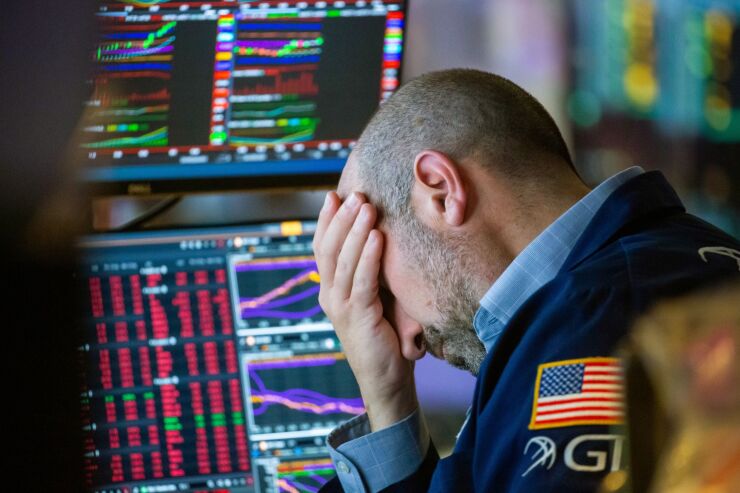
Traders are steeling themselves for the risk of more turbulence after the biggest U.S. bank collapse since the 2008 financial crisis sent shockwaves through markets.
The unravelling of SVB Financial Group's Silicon Valley Bank was driven in large part by the fallout from higher U.S. interest rates, prompting questions about whether other institutions might also be at risk as investors debate just how much further the U.S. central bank is likely to tighten policy. Meanwhile, the outlook for the economy — and likely policy responses to it — remain in flux.
Foreign-exchange markets will be the first to take the spotlight as the new week begins and Asia-Pacific trading gets underway Monday. Traders will be keen to see whether haven currencies such as the Swiss franc and Japanese yen extend the gains they made Friday, and whether the dollar continues to move lower along with expectations for shorter-term Treasury yields.
"The market is flitting from theme to theme, unveiling underlying fragility," JPMorgan Chase strategists including Meera Chandan wrote in a note to clients Friday.
Attention will be keenly focused on anything that gives clues about the next steps from the Federal Reserve and its global peers — or hints at greater spillover in the U.S. banking sector beyond SVB.
The Federal Deposit Insurance Corp. and the central bank were weighing creating a fund that would allow regulators to backstop more deposits at banks that run into trouble, according to people familiar with the matter. Meanwhile, U.S. regulators overseeing SVB's breakup were racing to sell assets and make a portion of clients' uninsured deposits available as soon as Monday, people familiar said.
For Fed policy observers, a major focus of the week is likely to be Tuesday's consumer-price inflation reading. In the euro area, the key event is Thursday's European Central Bank decision, at which officials are widely expected to jack up rates by a half point.
It was a wild ride for markets last week. Expectations for Fed rate increases surged in the wake of hawkish comments by Chair Jerome Powell, only to be reversed as fears around the banking sector and a mixed report on jobs helped fuel a rally in Treasuries. By week's end, the market was back to pricing a quarter-point Fed hike as the most likely outcome, having at one stage come around to the idea of a half point.
The two-day drop in the two-year Treasury yield seen on Thursday and Friday was of a scale last seen amid the global crisis of 2008, while an index of U.S. bank stocks notched its worst week since the early part of the COVID pandemic in 2020. The Bloomberg Dollar Spot Index fell as much as 0.9% at one stage on Friday, the biggest intraday drop since early January. It ended just 0.4% lower on the day and remained up on the week.
The SVB situation is a "timely reminder" that when the Fed is focused on reining in inflation with interest rate hikes "it often ends up breaking things," Capital Economics' Chief North America Economist Paul Ashworth wrote in a note Friday. "Regardless of whether the problems show up first in the real economy, asset markets or the financial system, they can trigger an adverse feedback loop that develops into a hard landing, which takes down all of them."
China will also be in focus for many traders as the week gets underway following the reappointment of several top economic officials. People's Bank of China Governor Yi Gang, 65, will remain in his post, as will the finance and commerce ministers. The retention of Yi and others — announced at the National People's Congress, the annual parliamentary gathering — surprised analysts who were expecting a larger reshuffle. Meanwhile, He Lifeng, a close ally of President Xi Jinping, was appointed a vice premier, signaling he could replace Liu He as the nation's top economic official.






